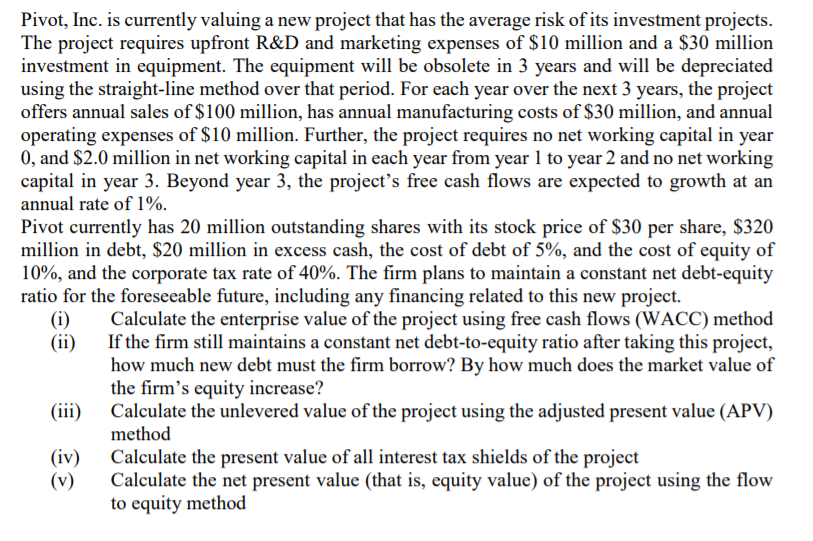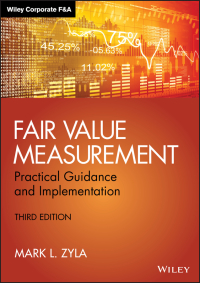
Pivot, Inc. is currently valuing a new project that has the average risk of its investment projects. The project requires upfront R&D and marketing expenses of $10 million and a $30 million investment in equipment. The equipment will be obsolete in 3 years and will be depreciated using the straight-line method over that period. For each year over the next 3 years, the project offers annual sales of $100 million, has annual manufacturing costs of $30 million, and annual operating expenses of $10 million. Further, the project requires no net working capital in year 0, and $2.0 million in net working capital in each year from year 1 to year 2 and no net working capital in year 3. Beyond year 3, the project's free cash flows are expected to growth at an annual rate of 1%. Pivot currently has 20 million outstanding shares with its stock price of $30 per share, $320 million in debt, $20 million in excess cash, the cost of debt of 5%, and the cost of equity of 10%, and the corporate tax rate of 40%. The firm plans to maintain a constant net debt-equity ratio for the foreseeable future, including any financing related to this new project. (i) Calculate the enterprise value of the project using free cash flows (WACC) method (ii) If the firm still maintains a constant net debt-to-equity ratio after taking this project, how much new debt must the firm borrow? By how much does the market value of the firm's equity increase? (iii) Calculate the unlevered value of the project using the adjusted present value (APV) method (iv) Calculate the present value of all interest tax shields of the project Calculate the net present value (that is, equity value) of the project using the flow to equity method Pivot, Inc. is currently valuing a new project that has the average risk of its investment projects. The project requires upfront R&D and marketing expenses of $10 million and a $30 million investment in equipment. The equipment will be obsolete in 3 years and will be depreciated using the straight-line method over that period. For each year over the next 3 years, the project offers annual sales of $100 million, has annual manufacturing costs of $30 million, and annual operating expenses of $10 million. Further, the project requires no net working capital in year 0, and $2.0 million in net working capital in each year from year 1 to year 2 and no net working capital in year 3. Beyond year 3, the project's free cash flows are expected to growth at an annual rate of 1%. Pivot currently has 20 million outstanding shares with its stock price of $30 per share, $320 million in debt, $20 million in excess cash, the cost of debt of 5%, and the cost of equity of 10%, and the corporate tax rate of 40%. The firm plans to maintain a constant net debt-equity ratio for the foreseeable future, including any financing related to this new project. (i) Calculate the enterprise value of the project using free cash flows (WACC) method (ii) If the firm still maintains a constant net debt-to-equity ratio after taking this project, how much new debt must the firm borrow? By how much does the market value of the firm's equity increase? (iii) Calculate the unlevered value of the project using the adjusted present value (APV) method (iv) Calculate the present value of all interest tax shields of the project Calculate the net present value (that is, equity value) of the project using the flow to equity method







